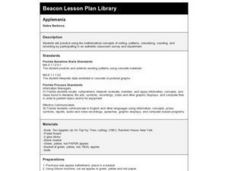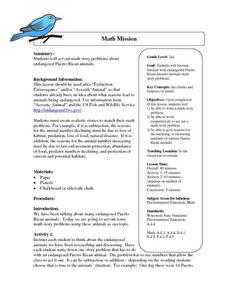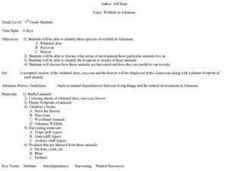Curated OER
Centipede or Millipede?
Students discuss millipedes and centipedes in terms of their classification as arthropod. Using a diagram, students categorize and compare and contrast the characteristics of millipedes and centipedes based on their discussion of...
Curated OER
Identifying Trees Using Their Leaves in the Summer
Students discover how to identify trees. In this research lesson students use dendrology to decipher what a trees classification is and explore each trees traits.
Curated OER
The World of Insects and Spiders
Students identify numerous insects and their body parts. In this insect life lesson plan, students practice using scientific vocabulary while comparing the different parts of spiders and insects. Students view several videos discussing...
Curated OER
Science NetLinks: It Counts
Pupils explore how numbers are assigned to objects, as well as think about more, less, or equal values. They describe, compare, and classify plants.
Curated OER
Delicious Graphing
Fourth graders sort trail mix by type and use that information to create different types of graphs for comparing.
Curated OER
Sink or Float?
Students predict and explore to discover which objects sink or float in fresh and salt water, predict how salt affect objects, write predictions on T chart, discuss difference between man-made and natural waters, and graph results.
Curated OER
Applemania
First graders read "Ten Apples Up On Top!" and view real apples in a basket. They taste different kinds of apples and describe the tastes: sour, sweet, etc. They graph everyone's favorite apple. They interpret the graph and draw their...
Curated OER
Rock Sorting
First graders observe rocks, record their observations about the rocks and classify them according to their observations. As a class, 1st graders create a list of observable characteristics of rocks. They sort a group of rocks...
Curated OER
Who's There
Fifth graders, in groups, make a list of at least three animals that would survive well in a particular environment. After an allotted time, they pass their list to another group, where they will add to it. They discuss adaptations each...
Curated OER
Out of Sight, Out of Mind
Students analyze and graph the waste created in a typical lunch period. They increase awareness of various types of garbage students create during a lunch period. They construct and label a graph of lunch waste. They brainstorm...
Curated OER
Grouping Fish
In this fish worksheet, students group fish according to their similarities. Students explain their reasoning for sorting the fish the way they did. This worksheet has 12 fill in the blank questions and 1 short essay.
Curated OER
Identify, Sort, Classify
Students improve their identifying, sorting, and classifying skills. For this categorizing lesson, students use cubes to practice their sorting, classifying, and identification skills.
Curated OER
Sorting and Classifying
Students explain why objects area grouped and sequenced in a certain order. In this sorting and classifying lesson plan, students use the website Studyzone.org.
Curated OER
The Physiological Tolerance of Two Species of Protozoans
Students examine the differences in pH tolerance between the two species and relate these differences to their respective niches.
Curated OER
Natural Selection
Pupils model natural selection by using various utensils to "capture food" using a simulated species called "Woolybooger's."
Curated OER
Got the Whole World in My Hands
Young scholars review factors that threaten survival of different species. this lesson plan is part of a multi-segmented unit on animal survival.
Curated OER
Diversity of Life
Students explore the diversity of life forms and the role that interdependency plays in our world through a mult-segmented unit. This segment introduces the unit.
Curated OER
Show Some Backbone and Teach Invertebrates
Fifth graders identify two similarities and two differences between two phyla, assign fictitious invertebrate to its phylum and explain why it belongs in that grouping, and construct member of given phylum and explain why it should be...
Curated OER
Learning To Identify Insects
Students utilize the Internet to locate a variety of insects. The pictures located are compared and contrasted and placed into a book which is published by the class.
Curated OER
Website Scavenger Hunt
High schoolers use the internet to complete a species scavenger hunt. In groups, they answer questions given to them about sea lions, rockfish and killer whales. As a class, they identify any questions they have and discuss the role...
Curated OER
Math Mission
Second graders investigate the concept of Puerto Rican animals through using math word problems. They create a story to correlate with the word problems. The lesson also uses data of species counts to show increases and decreases for...
Curated OER
Sampling Variation in a Natural Population
Students examine the phenotypic variation within a natural population of a single species. They collect data on the species and analyze the data using statistical/spreadsheet software. Students interpret their results and present their...
Curated OER
Natural Selection Simulation
Students simulate the changes in a natural population of birds or other species. They establish baseline data of population fluctuation for a closed population with a stable food supply. They graph the data to complete their mutations.
Curated OER
Wildlife in Arkansas
First graders identify three species of wildlife in Arkansas. They discuss the environment in which the whitetail deer, raccoon, and beaver live in. They identify the footprints of each animal and discuss how the animals are harvested...

























